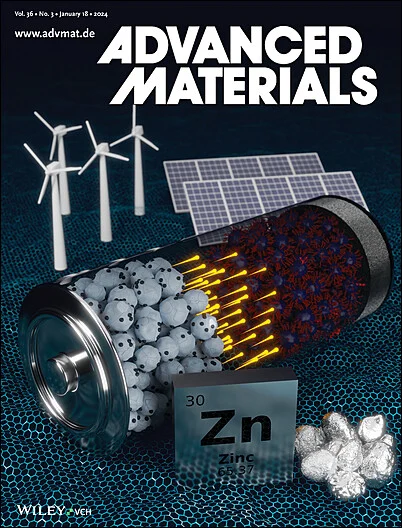Phagocytosis-Activating Nanocomplex Orchestrates Macrophage-Mediated Cancer Immunotherapy
IF 27.4
1区 材料科学
Q1 CHEMISTRY, MULTIDISCIPLINARY
引用次数: 0
Abstract
The phagocytosis of macrophages to tumor cells represents an alluring strategy for cancer immunotherapy; however, its effectiveness is largely hindered by the detrimental upregulation of anti-phagocytic signals and insufficient expression of pro-phagocytic signals of tumor cells. Here, a pro-phagocytic polymer-based nanocomplex is designed to promote the macrophage engulfment of tumor cells through concurrent modulation of both the “eat me” and “don't eat me” signals. The nanocomplex MNCCD47i-CALRt is formed by complexing a synthetic PAMAM derivative (G4P–C7A) that is capable of intrinsically inducing the exposure of calreticulin (CALR, a crucial pro-phagocytic protein) and a small inference RNA that can inhibit the expression of CD47 (a primary anti-phagocytic protein). MNCCD47i-CALRt can significantly delay tumor growth and prolong the survival of tumor-bearing mice with negligible hematopoietic toxicity in multiple murine colorectal cancer models. Furthermore, the pro-phagocytic capacity of MNCCD47i-CALRt is validated in the patient-derived tumor organoid model. Collectively, the phagocytosis-promoting nanocomplex provides a simple and potent strategy for boosting macrophage-mediated cancer immunotherapy.

吞噬激活纳米复合物协调巨噬细胞介导的癌症免疫治疗
巨噬细胞对肿瘤细胞的吞噬是癌症免疫治疗的一种诱人策略;然而,其有效性在很大程度上受到肿瘤细胞抗吞噬信号的有害上调和促吞噬信号表达不足的阻碍。本研究设计了一种促吞噬聚合物纳米复合物,通过同时调节“吃我”和“不要吃我”信号,促进巨噬细胞对肿瘤细胞的吞噬。纳米复合物MNCCD47i-CALRt是由合成的PAMAM衍生物(G4P-C7A)络合而成,该衍生物能够内在地诱导钙网蛋白(CALR,一种重要的促吞噬蛋白)和一种可以抑制CD47(一种主要抗吞噬蛋白)表达的小推断RNA的暴露。在多种小鼠结直肠癌模型中,MNCCD47i-CALRt可以显著延缓肿瘤生长,延长荷瘤小鼠的生存期,而造血毒性可以忽略不计。此外,MNCCD47i-CALRt的促吞噬能力在患者源性肿瘤类器官模型中得到了验证。总的来说,促进吞噬的纳米复合物为促进巨噬细胞介导的癌症免疫治疗提供了一种简单而有效的策略。
本文章由计算机程序翻译,如有差异,请以英文原文为准。
求助全文
约1分钟内获得全文
求助全文
来源期刊

Advanced Materials
工程技术-材料科学:综合
CiteScore
43.00
自引率
4.10%
发文量
2182
审稿时长
2 months
期刊介绍:
Advanced Materials, one of the world's most prestigious journals and the foundation of the Advanced portfolio, is the home of choice for best-in-class materials science for more than 30 years. Following this fast-growing and interdisciplinary field, we are considering and publishing the most important discoveries on any and all materials from materials scientists, chemists, physicists, engineers as well as health and life scientists and bringing you the latest results and trends in modern materials-related research every week.
 求助内容:
求助内容: 应助结果提醒方式:
应助结果提醒方式:


